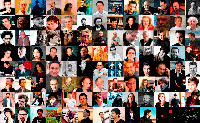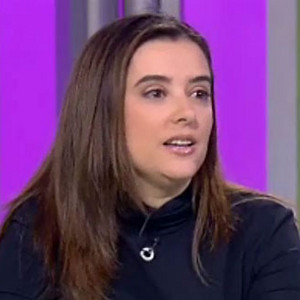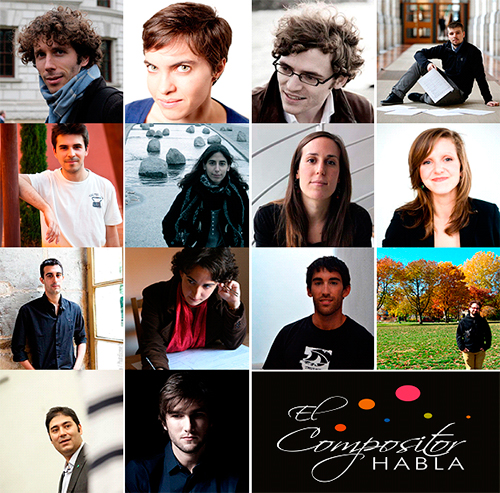Entrevistas
Mark Andre | Lleno de intersticios y con tanto! que leer entre líneas
11/05/2014
"I like to pray very much. Praying seems to me not so far away from composing, at least for me."
Ruth Prieto, for ComposerSpeaks, interviews composer Mark Andre
Berlín, May 2014
.jpg) 1. Ruth Prieto: Which characteristics define you best?
1. Ruth Prieto: Which characteristics define you best?
Berlín, May 2014
.jpg) 1. Ruth Prieto: Which characteristics define you best?
1. Ruth Prieto: Which characteristics define you best?
Mark Andre: In composition what I try to do is to develop compositional interstices which are between polarities: they can be structural or morphological polarities but these interstices seem to me to be very central in my work.
2. R.P.: What inspires you as a composer and why?
"… last call … you have to run to your plane otherwise they won´t wait for you anymore the older I get the more I feel this last call, more and more stress."
Mark Andre: How can be the sound situation, the reflected sound situation or structural situation or organizational situation … how can you incorporate it and in fact it means that you can also suggest existential or vertical and transcendental situations … an example is time families … I try to combine or make more categories of time families like metrical, rhythmical, chronometrical, morphological time families, structural morphological impacting making the musical time and also typological time families when you have to deal with ultra music theatre.
3. R.P.: What are you working on now?
Mark Andre: The premiere of my opera in Stuttgart Wunderzaichen. It was finishing at the end of March. I was making corrections … it´s a huge score … two hours for choir, orchestra, electronics. Now I´m working on a piece for Ensemble Modern in Frankfurt.
4. R.P.: Is it an orchestral piece?
Mark Andre: It´s for 14 soloists.
5. R.P.: What´s your main obsession when you are working?
"I try to be as consequent as possible regarding the use and deployment of sound, morphology, sound families and regarding the deployment of formal processing … "
Mark Andre: Of course there are more layers. I try to be as consequent as possible regarding the use and deployment of sound, morphology, sound families and regarding the deployment of formal processing … and the main purpose is to try to make it not only as morphology as sound elements but I hope very much to reach the point where situations in the pieces are also suggesting transcendental, vertical situations … perhaps it sounds esoteric but it is not esoteric it is the presence of high spirits.
6. R.P.: Can you define «contemporary»? and in which way Mark André is “contemporary”?
Mark Andre: I would say that I try to musically make the music as incorporation of presence of the Holy Spirit and of Jesus of Nazareth. You don´t have to be Christian or religious to hear that in my music … it´s not the purpose … but I can get a transcendentalism maybe regarding the deployment of this other category of presence … I hope that it is not sounding too esoteric.
7. R.P.: What are your musical roots (real or imaginary)?
" I´m a French German person so like cars I´m a kind of hybrid. Also kind of interstices. Officially I´m German French person. And also neither. The roots are not directly connected to a place."
Mark Andre: I´m a French German person so like cars I´m a kind of hybrid. Also kind of interstices. Officially I´m German French person. And also neither. The roots are not directly connected to a place. Of course Berlin is my city for emotional reasons but on the other hand as far as I feel that presence of the Holy Spirit and the presence of the resurrected Jesus of Nazareth. It´s a kind of energy when I hear Matthau Passion by Bach … it´s a huge master piece. Of course, Berlin. I couldn´t imagine living anywhere else. Full of interstices. A lot of between the lines. Things are not fixed like Paris.
8. R.P.: Have you got any eccentricities when you are composing?
Mark Andre: I like to pray very much. Praying seems to me not so far away from composing, at least for me. Here I have some pictures of representations of Jesus and Magdalena, Saint Catherine etc…
9. R.P.: What is composition for you in this day and age? Do you think it is difficult to be a composer now?
Mark Andre: Two things. I´m a church composer. Spirituality is very important to me and I´m a religious person … protestant but Lutheran. And I would say that nowadays there is no place for that. I was today at church. And I will be there on Friday. They don´t care there about contemporary and new music. There is no money there is no wish, there is no money. In the time of Bach, Haendel there was in Germany a big connection between contemporary music and church with support. There was a connection. Nowadays there is no connection. There was no place for contemporary music in church now. On the other hand, spiritual music in other arts settings is not at all. Of course you can play Bach Passion and they do it. But it must not be forgotten that those pieces were written for church and for Easter Friday. It´s spiritual music religious music … not in the sense of proselytism … but something to do with transcendence … there´s no real role for that now and this is typical of this time now and I would say that paradoxically this is more tolerated by laicistic institutions and unfortunately I must say because I am a religious person that at church it is very difficult … and it is a sign of the times in regard to your question and my situation now as composer I will turn relatively quickly now … fifties .. which is not so fantastic now but that´s life there’s always more and more pressure as you get older … airplanes … last call … you have to run to your plane otherwise they won´t wait for you anymore the older I get the more I feel this last call, more and more stress.
10. R.P.: If you had not been a composer, what would you like to have been?
Mark Andre: Composing is central. But I admire the priest as in what they do here for the unemployed … helping the poor people. It´s really something special. Perhaps you know the composer Dieter Schnebel … he is over eighty. Great composer but he´s also a protestant priest and he´s really great but I´m only a composer.
11. R.P.: Have you got a composer of reference?
Mark Andre: Everything was always there. The discovery of some movements I could play from Beethoven sonatas not the big ones but the first ones and not full but some movements that I could play was for me a big revelation and for me he´s the greatest composer ever. For all possible compositional reasons. Compression. Totally reduced material. But also for the way he works it´s unprotected he puts himself in a situation where he is not protected and to put everybody in non protection Of course, I have a lot of admiration for great masters of history. But he´s the best. The first time I was working it was really a revelation. I´m totally impressed but also completely moved. He´s very intellectual. We know all his chords. He´s been thoroughly analyzed. Very incredible …
12. R.P.: What do you expect from the future?
Mark Andre: I hope that my opera … will not vanish definitively. If I can remark: an opera house … the repertoire is a massive fabric of remembering. You remember the death of Isolde you remember the worries of Edith and …. In contemporary music it´s a lot about vanishing. Vanishing means that you have commissions. And you have the performance but the pieces are more or less quickly or not so quickly vanishing a lot and it’s not about … and as composer, there is no impact of that. I’m very fatalistic about that.
13. R.P.: What would you like to do in music that you have not been asked to do yet?
"You don´t have to be Christian or religious to hear that in my music … it´s not the purpose …"
Mark Andre: I try something for a long time but I don´t know if I succeed. The most fascinating stuff has a sound situation. In the gospel … in John, Marcus … you know Jesus after his death he says to Magdalena “don´t touch me” but when she recognizes him he disappears as opening another category of presence and also Emma was later with the two other people of this communion stuff… so I think that the most fascinating thing is how was it sounding this vanishing … this act of disappearing and very quick … I cannot imagine that there was no sound in the situation … this disappearing and I try as far as I could to reflect it this sound of disappearing.
14. R.P.: What would Mark Andre say about Mark Andre?
Mark Andre: It´s very difficult to say. I would hope he could somehow on his way reach to be somehow authentic and consequent by composing and if yes it would be still something and I mean authentic and consequent by self discovery and I hope that he will be always more and more in this trying situation.
Mark Andre, Berlín, May 2014
Más información en: Editorial Peters
Hochschule Dresden
Soundcloud
Biblioteca
Destacamos ...
Nueva Sección Directorio
dedicada a la promoción de compositores, intérpretes, instituciones y editoriales.

dedicada a la promoción de compositores, intérpretes, instituciones y editoriales.



